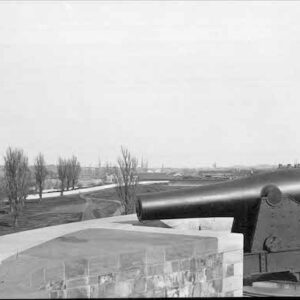Tag: Fort McHenry MD
Wikipedia says: Fort McHenry is a historical American coastal pentagonal bastion fort on Locust Point, now a neighborhood of Baltimore, Maryland. It is best known for its role in the War of 1812, when it successfully defended Baltimore Harbor from an attack by the British navy from the Chesapeake Bay on September 13–14, 1814. It was first built in 1798 and was used continuously by the U.S. armed forces through World War I and by the Coast Guard in World War II. It was designated a national park in 1925, and in 1939 was redesignated a “National Monument and Historic Shrine”.
During the War of 1812 an American storm flag, 17 by 25 feet (5.2 m × 7.6 m), was flown over Fort McHenry during the bombardment. It was replaced early on the morning of September 14, 1814, with a larger American garrison flag, 30 by 42 feet (9.1 m × 12.8 m). The larger flag signaled American victory over the British in the Battle of Baltimore. The sight of the ensign inspired Francis Scott Key to write the poem “Defence of Fort M’Henry” that was later set to the tune “To Anacreon in Heaven” and became known as “The Star-Spangled Banner”, the national anthem of the United States.
Civil War
During the American Civil War the area where Fort McHenry sits served as a military prison, confining both Confederate soldiers, as well as a large number of Maryland political figures who were criticizing then President Abraham Lincoln. The imprisoned included newly elected Baltimore Mayor George William Brown, the city council, and the new police commissioner, George P. Kane, and members of the Maryland General Assembly along with several newspaper editors and owners. Francis Scott Key’s grandson, Francis Key Howard, was one of these political detainees. Some of the cells used still exist and can be visited at the fort. Fort McHenry also served to train artillery at this time; this service is the origin of the Rodman guns presently located and displayed at the fort.
On 25 May 1861 John Merryman was arrested in Baltimore County and imprisoned in Fort McHenry. Merryman had had a role in destroying bridges in Maryland to impede the movement of Union troops. Merryman petitioned Supreme Court Chief Justice Roger B. Taney for a writ of habeas corpus, and Taney granted the petition, demanding that Merryman appear in his courtroom the next day and sending U.S. Marshals to the fort to enforce the ruling. A famous and dramatic standoff then occurred at the gates of the fort between the Federal Marshals and General George Cadwalader, the commander of Union troops of the Fort. The commander refused to comply with the order on the grounds that he was acting under orders from President Abraham Lincoln, who had suspended habeas corpus. The court case, Ex parte Merryman, remains unresolved, and the Executive Branch continued to refuse to comply with Taney’s ruling.
Showing the single result
